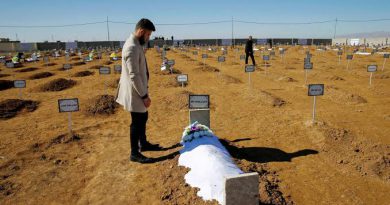FAKE: Saudi Arabia removes Quran studies from public schools
by Zahack Tanvir and Afreen Baig
Meem Magazine recently claimed that Saudi Arabia has removed Quran studies from schools. This dubious propaganda operation was done by a team of hardliners based in Tunisia and Turkey.
After investigating the magazine’s Facebook page, it shows that a sponsored team based in these countries along with France, carried out this misguiding story. While the other stories of the magazine carry pro-Muslim Brotherhood propaganda.
It’s goes without doubt why such paid influence operations are very often carried out against the Kingdom of Saudi Arabia, and its leaders.
The reality is, Saudi government has merged multiple Islamic subjects into one single book, and introduced five new science subjects as well—to keep the students up-to-date with the scientific developments.
Saudi schools will teach English language starting from Grade-1, while digital skills, social studies, physical education, self-defense from Grade-4 onwards.
However, this information has been misconstrued, and lied upon by the Meem Magazine.
Ibtisam Al Shehri, spokesperson of the Ministry of Education, confirmed in the Ya Hala show on Rotana TV that, among the curriculum development was the merging of Islamic education subjects, including jurisprudence, hadith and interpretation into one book.
The education ministry has not shunned teaching Islamic subjects. But in order to introduce other competitive subjects, the ministry has merged different Islamic subjects into one subject.
For example, in O-Levels and Intermediate, Pakistani students prefer Pakistan Studies instead of History, Geography, Constitution of Pakistan, Leaders of Pakistan, etc. separately. And, they learn Islamiyaat as one subject instead of five different subjects.
Saudi Gazette published a report that, the Ministry of Education added new subjects such as English language, digital skills, social studies, physical education, self-defense, and the latest decisions in developing curricula for all educational levels in public education, were the inclusion of sign language in the (family education and life skills) curriculum.
Classes related to activity and vocational training have also been added, including “Mus’haf Madrasati” which is specialized in teaching the Holy Quran to help students with special needs to learn.
On the other hand, Saudi Arabia has banned extremist literature of Muslim Brotherhood, and the government has ordered to remove the texts which speak about sectarian divides.
These steps taken by the Saudi government have given a major blow to the extremist groups and their affiliates. Hence, they resort to negative influence operations against the Kingdom—which is very often done by touching the emotional threads of the Muslim community.
The hardliners understand the psychology of Muslims that a Muslim would feel offended if he is told that a Muslim government like Saudi Arabia has banned the teaching and learning of God’s final revelation. Moreover, it becomes easy for the radical sects to exploit these emotions for their political purposes.
The matter is plain and simple unless a person chooses to fall into the trap of disinformation.
Zahack Tanvir is a Saudi-based Non-Resident Indian. He is an IT Consultant, Computer Engineer, and also holds Dip. in Journalism from London. He is the founder of MilliChronicle. He often writes and tweets against political Islam. He can be followed under @ZahackTanvir.
Afreen Baig is an independent political analyst on the contemporary issues of Middle-East and the Arab World. She writes for The Milli Chronicle. She can be followed under @afrenebege.



